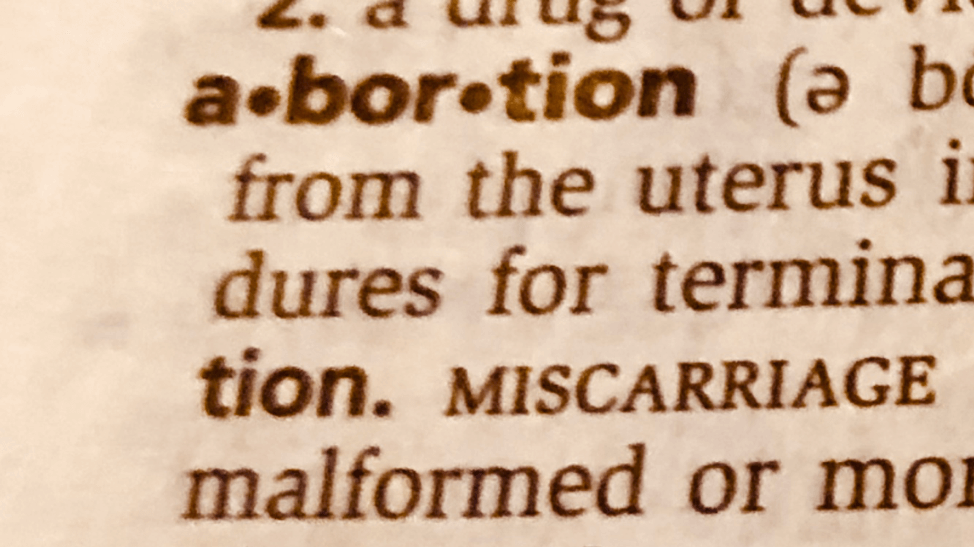Photo Credit: Luke Phillips
Braver Angels Dispatch, by Nayeli L. Riano
Editor’s note: In the wake of various public controversies over the question of abortion, Braver Angels’s media team is publishing a pair of pro-life and pro-choice pieces on abortion. This is the pro-life piece. Neither piece represents the official views of Braver Angels as an organization; they are meant, rather, to demonstrate civil and depolarizing, yet passionate and well-argued, discourse on issues of extreme importance to our country. -LNP
The legal right to an abortion has reentered American public discourse after the recent, restrictive laws passed in Georgia and Alabama and the largely permissive laws passed last year in New York and Virginia.
The right to an abortion is a complicated topic that has no correct legislative answer. Roe v. Wade did not get the issue right, but neither would a court decision that restricts all rights to abortion. As a start, we should assume that the inherent rightness or wrongness of terminating a pregnancy should not be determined by the state. The state’s responsibility, instead, is to find the best middle ground most conducive to nourishing a humane society, one which upholds values that preserve human dignity at both the personal and social levels.
But abortion, already a controversial issue, is further divisive because it is grouped in with the greater agenda of “women’s rights.” The way the issue is discussed nowadays, one could be forgiven for thinking that women’s rights advocates should not blindly support a woman’s right to choose unconditionally, without first elaborating on the nuances of this issue.
A complicated but necessary first step in this debate is to distinguish between two concepts—the right to abortion, and respect for women’s agency and dignity. It is important to distinguish between pushing an agenda for greater women’s rights, and pushing an agenda for a woman’s right that affects the life of another being. Whatever the middle ground compromise, it must account for the life of an unborn infant.
Once both sides can agree that it is important both to protect the liberty and lives of women and to protect the lives of unborn children, we can begin to delve into the best solution for an issue that, no matter the choice, will always have negative externalities. The debates on abortion would benefit from affirming a common ground that sustains a moral equivalence between women and children.
As pro-life advocates, we can take the first step by admitting that women certainly do have it harder, regarding the burdens of carrying and raising a child. Having a baby changes a woman’s life much more than a man’s, physically and emotionally. Pro-choice advocates and feminists are right to point out the liberty with which men can play their part in the creation of a life, the same liberty with which they can choose to leave and avoid sharing the responsibilities of a pregnancy. Since women do not naturally have such an exit, abortion rights are perceived as being reasonable equalizers.
Abortion debates tug at the roots of feminism, as well they should since their questions touch at the core of what it means to be a woman. A second question, then, is whether a woman—since she is at higher risk of having her life altered by pregnancy and child-raising—should be entitled to the freedom to choose whether or not she wants to escape that alteration through abortion.
Pro-choice advocates answer affirmatively. The pro-life advocate, on the other hand, might look at the social consequences of this freedom. One’s freedom to choose their own course in life is not the central issue here; rather that freedom, per the pro-life perspective, should not be removed and taken as an isolated incident from the actions that led up to the pregnancy. We cannot start a new life by liberating ourselves of our past.
Of course, most pro-life advocates are willing to tackle these issues on a case-by-case basis, especially in cases of rape, crippling deformity, and danger to the mother’s life. Similarly, pro-choice advocates should be willing to specify cases of policy compromise for extreme scenarios, since loose criteria over what should constitute a legal right to an abortion can have serious consequences.
The medicalization of language regarding life in the womb, especially from doctors, has the effect of distorting the humanity of a fetus, and desensitizes women to the fact that they’re carrying a human being. Another issue that needs to be depolarized is the language that we use when describing a fetus. It should not be controversial to agree that abortion is a serious decision to make, because it will always involve ending the development of a life.
If we can at least continue to use language that describes the life of a developing, unborn infant for what it is—not “yolk sacs”—we can better inform our understandings of what pregnancy means. There are, of course, many pro-choice advocates who disagree about when, exactly, life “begins,” and it might seem like an impossible point over which to reach a consensus.
But if there wasn’t something to be said for the argument that life begins at conception, then most methods of contraception would not focus on avoiding pregnancy during the initial stage of intercourse. Pro-choice advocates, by demonstrating respect for this very popular view on life, could open room for pro-life advocates to begin to explore the arguments in favor of legal abortion on a case-by-case basis.
Legislation on abortion should continue to stress the irreplaceable role that women play in society. But it would help if we could all acknowledge that part of that special role comes from their function and effort as the mothers who raise our up-and-coming generations, sometimes with the help of men and sometimes without it. There is too much anti-motherhood campaigning, and too much economic reality making motherhood harder, which are socially detrimental as they dissuade women from valuing family and unity. A culture—a society and its government—that does not equally stress the beauty, strength, and love which motherhood embodies should not expect pro-life advocates to accept more liberal abortion laws.
A good place for pro-choice advocacy groups to start would be by removing the anti-motherhood rhetoric that implies that becoming a mother is an oppressive act. Instead, a movement that claims to push women’s rights could work towards advocating for more rights for mothers. The act of bringing a child into the world is an undeniable act of love that has enough persuasive strength on its own, if only we let women have the opportunity to experience it. As the “motherhood feminist” of this constructive essay explains, “As long as we denigrate maternity, we are denigrating women.”
We might start at a point where both sides affirm the love of mothers for children. No self-respecting pro-life politician would take pride in having a stance that undermines an entire gender; it is more likely that that a pro-life politician values the lives of unborn children and respects the act of motherhood, than that he or she holds women in contempt and wants to control their bodies.[1] This is a reality that that could help the pro-choice constituency to better understand the pro-life understanding on the matter.
I attended a conservative conference last year where the emotional speaker, a Christian woman, elaborated on a story about a friend who was going to have an abortion, and broke into tears during the talk as she recalled telling her friend “Don’t you realize? You’re about to go sacrifice.” The sympathy that pro-life advocates have for an unborn child and the mother is just as strong as the sympathy that pro-choice advocates have for women.
This anecdote opens up another important question about the abortion debate that is worth revisiting. Is it true that the pro-life movement is inherently Christian?
The pro-life view on abortion, even if it is commonly associated with Christianity, is one that values and upholds the integrity of the family, and whose sources come from beyond Christianity alone. Judaism has similar teachings on conception, valuing a culture that cherishes life. Pro-choice advocates, by acknowledging respect for the importance that Judeo-Christian traditions have played in the development of our society, would go far in building a dialogue bridge. Although the debate, for a pro-life advocate, is naturally centered around the life of the unborn child, it has wider implications that transcend Christian theological teaching on the conception of life, and go outward to our whole society.
Abortion has consequences on relationship bonds as it releases fathers and mothers from any responsibility or obligation to each other and their children, thus hurting the formation of families. Pro-life advocates, Christians, conservatives, and the vast majority of communitarian anti-abortion thinkers, contemplate that the future outcomes of legislation claiming to protect women could, potentially end up harming women and society in the long run. Is there not validity in this concern?
Our life is not our own, and it goes both ways, for the legislator who assumes he or she knows what is best for a woman with a complicated pregnancy, and for the woman who assumes she knows what is best for herself and her unborn child. Just as politicians making anti-abortion legislation for women might not be taking into consideration the lives of the women they are impacting, so might a woman’s decision to terminate a pregnancy ultimately not be taking the potential life of her child into consideration.
All actions are consequential, and no act can stand as an isolated incident. To the conservative’s mind, abortion and legislation on abortion also implies legislation on our responsibility over our own sexuality, and the relationships into which we enter. It is not a means meant to limit sexuality; instead, it is a way to remind us that we have a responsibility for our actions, intentional or not.
The dilemmas this responsibility inherently brings need not be solved through a stark choice between the extreme of preemptive abortion on the one hand, and the forced fostering of an unwanted life on the other. Solutions for the post-partum child are many—but responsibility and the questions that come with it are real.
Autonomy over one’s body is at the heart of the matter for the pro-choice advocate. Many of us have heard this argument from people who say that they would never get an abortion themselves, but that they would leave the issue to others deciding over their own body.
But there’s a problem. Nowadays, legislation passed to control and limit abortions is perceived as a way to control women’s bodies, not to protect the rights of an unborn life. If we can reach a point where a pro-choice advocate can assume that abortion legislation is an attempt to save lives, rather than to control their bodies, and where pro-life advocates adopt a more open-minded and empathetic habit of listening, to hear out women who might feel desperate enough to resort to abortion, and consider each case on its merits—then we will be at a place for conversation that begins with compassion. Both sides need to alter their arguments so that they are ultimately based on love for life—respecting the rights and agency of a woman, while protecting the very real rights of the child she carries in her womb.
The takeaway that I always find from my conversations with pro-choice advocates is that we need to be respectful of women’s choices, and consider what traumas and hardships they must have gone through in order to resort to abortion as an option. This consideration is the most compelling and humane argument that the pro-life constituency needs to make indisputably clear, when discussing abortion legislation with those who might oppose our views. We care about women and understand the difficulties that an unplanned pregnancy can have on a mother.
There are solutions, however, to help preclude the need for women to contemplate abortion as a solution. For example could push for more legislation providing economic justice to protect low-income mothers, since a majority of abortions are obtained by women with children who struggle to provide for them. These issues should be decided on a case-by-case basis, since everyone’s story will be different.
As for the main takeaway that pro-life advocates should try to impart in our conversations with pro-choice advocates, we can discuss the details of these cases to reach the best decision with the consensus of the mother as much as is needed. But in a larger sense, we cannot treat this matter for anything other than what it is: abortion ends the development of a life and, in some cases, ends a life. In both bases, it is an intentional act that affects a human life, so it requires some level of federal regulation.
If both sides can agree on compassion for the woman (on the side of the pro-life advocate,) and compassion for the unborn child (on the side of the pro-choice advocate,) then we will be taking one step in the right direction. We will allow our conversations to be guided by consideration for lives existing, and those lives yet to come.
Nayeli Riano writes on politics, faith, and culture. Follow her on Twitter @NayeliLRiano
[1]Both sides of this debate must acknowledge that no demographic will fall on one side of the issue, and it is not constructive to assume that anyone, because of their socio-economic status, gender, race, or faith, must agree with one argument over another. Although progressives sometimes seem to align minority women in general with a pro-choice politics, there are many cases of minority women who are undeniably pro-life. Take Democratic representative Katrina Jackson, who recently helped Louisiana put forward a heartbeat bill, the “Love Life Amendment.”





1 thought on “For Women, and for Life”
Ms. Riano,
While I can appreciate your desire to find a middle ground to the abortion debate, I find it difficult to believe that a middle ground can be found if both sides are compassionate to the mother and the unborn child/developing life/fetus/yolk sac. The fundamental clash between the pro-choice and pro-life sides is a constitutional clash between the right of the mother to be free of government interference, and the right of the child to be born. Compassion can go a long way to understanding the other’s point of view, but it has little place in the battleground of fundamental rights.
It is certainly possible to have more civil debates on the topic if we acknowledge the both sides make fundamentally sound constitutional arguments, that there is no obvious answer to the when a society should recognize a right to life, and when that recognition should result in sanctions against those who would end that life. That said, most people have little interest in the large constitutional questions that plagued the Supreme Court in Roe, and still continue to plague legislatures and the courts.
This kind of constitutional questioning and balancing of constitutional interests plagued the United States many years ago on the question of slavery. A grand compromise was tried – the Mason Dixon line. While the Mason-Dixon line proved to have some value in establishing when blacks had rights, it eventually proved to be unworkable as the competing interests, including the states’ interests eventually led to the establishment of a new nation – the Confederacy. That new nation was quickly quashed by the military invasion of the remaining parts of the old nation. In the long-run, compassion for the other side’s plight has little room in the discussion if it involves the suppression of a fundamental right.
I think we should all remember that Roe v. Wade is already the “great compromise”. Much of the reason that the debates over abortion are so fierce is that Roe did little to clarify a child’s right to life, and a woman’s right to abortion than existed before Roe, especially in the third trimester. What Roe seemed to conclude is that a state has the ability to establish a child’s right to life after viability, but that it under no obligation to do so. And, what it also failed to establish is why viability should be the magical test for government interference. Also left unanswered was the rights of a father to protect a child that is biologically one-half his child.
In my opinion, the middle ground of abortion involves an analysis of the Roe decision, for what it got right, for what it got wrong, and for what it left unanswered.